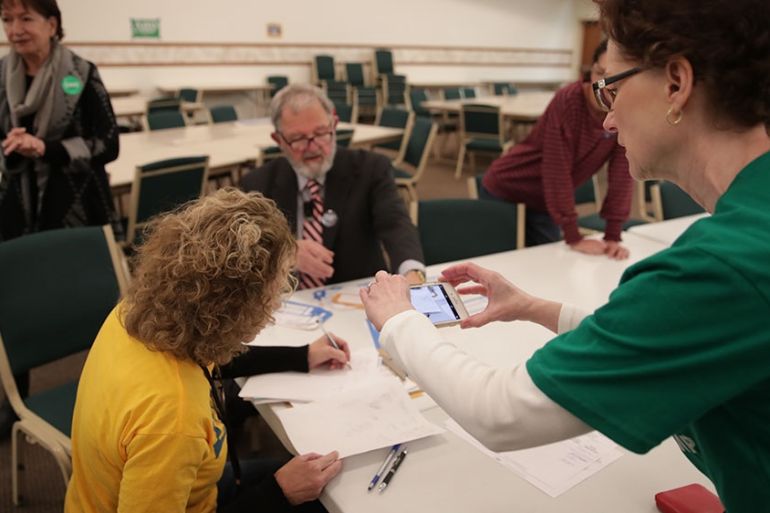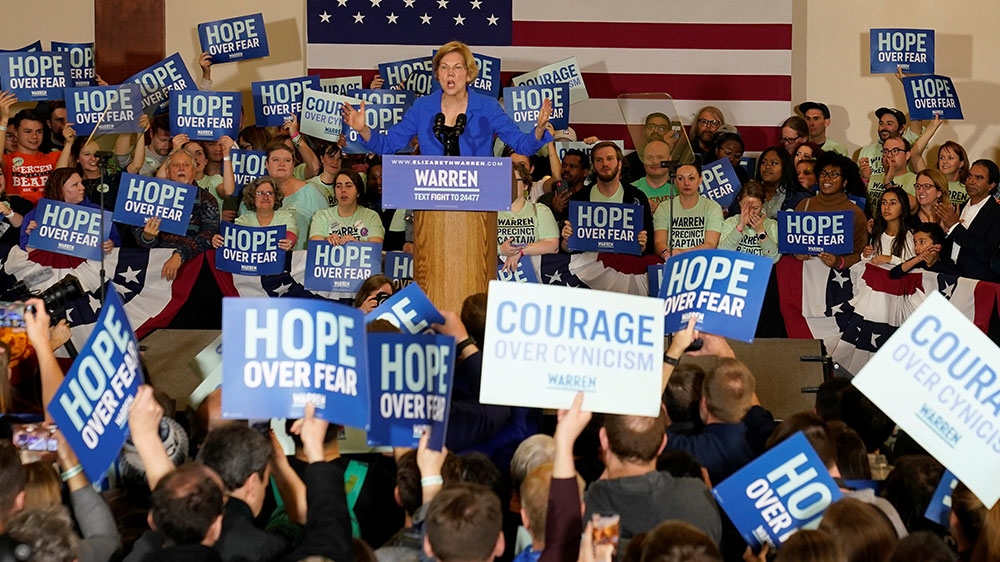Iowa caucus chaos due to ‘coding error’: Officials
Iowa Democratic Party to release partial results later on Tuesday after manually verifying data against paper backups.

A new mobile app was supposed to help United States Democratic officials quickly gather information from some 1,700 caucus sites throughout Iowa. Instead, a “coding issue” within the app is being blamed for delays that left the results unknown the morning after the first-in-the nation presidential nominating contest and caused chaos Monday night.
Glitches with a new mobile app Monday caused confusion, and some caucus organisers were forced to call in results for the state party to record manually, introducing delays and the possibility of human error. Iowa Democratic Party Chairman Troy Price said the delays were not the result of a breach and party systems were secure.
Keep reading
list of 3 itemsUS election 2020: What are presidential primaries and caucuses?
US elections 2020: When are the debates, primaries, conventions?
“While the app was recording data accurately, it was reporting out only partial data. We have determined that this was due to a coding issue in the reporting system,” Price said in a statement on Tuesday, adding the issue has since been fixed. “The application’s reporting issue did not impact the ability of precinct chairs to report data accurately.”
The Iowa Democratic Party told presidential campaigns it will release more than half of Monday’s delayed caucus results at 4pm local time (22:00 GMT) on Tuesday.
“We have always said that we have a paper trail in this process,” Price told campaigns on a briefing call. “We’ve always had to chase down results.”
Price said that the results would be released as they are finalised.
US Department of Homeland Security Acting Secretary Chad Wolf told Fox News on Tuesday that there was no indication of “any malicious cyberactivity”. He added that Iowa Democrats declined his department’s offer to test the reporting app. That’s not unusual, as outside security firms do similar testing. The state party had said previously that it had worked closely with security experts to test the app.
‘A mess’
Des Moines County Democratic Chair Tom Courtney said he heard that in precincts across his county, including his own, the mobile app was “a mess”. When precinct leaders called Democratic Party headquarters, “they weren’t answering the phones”, Courtney said.
The problems were an embarrassment for a state that has long sought to protect its prized status as the first contest in presidential primaries and the nation’s first vetter of candidates. The delay was certain to become fodder for critics who argued that the caucuses – party meetings that can be chaotic, crowded and messy – are antiquated and exclusionary.

The Iowa Democratic Party pressed forward with the new reporting system amid warnings about the possibility of hacking and glitches. Party officials said they took numerous security precautions and maintained that any errors would be easily correctable because of backups and a paper trail.
But organisers running precincts in Iowa didn’t get to test the app beforehand. Iowa party officials had said they would not be sending the new mobile app to precinct chairs for downloading until just before the caucuses to narrow the window for any interference.
Some precinct chairs said they had trouble downloading or logging into the app and didn’t use it.
The apps were barely working Monday night, according to a person involved in processing the data who requested anonymity to discuss the party’s internal system. That forced party aides to record results from the precincts via phone and enter them manually into a database. Officials were left using photos of results to validate outcomes and ensure accuracy.

Jonathan Green, who chaired a precinct in Lone Tree, Iowa, said that when he tried to put the results into the reporting app, he kept getting a confusing error message: “Unknown protocol. The address specifies a protocol [e.g., “wxyz:??”.] the browser does not recognise, so the browser cannot properly connect to the site.”
He said he ultimately gave up and tried to call in the results to the party. Like others, he was put on hold for an extended period of time. In the end, it took hours to report results from his small site, he said.
Risky
The slowdown was exacerbated by the fact that the party was for the first time attempting to report three different sets of data – an initial headcount of each candidates’ support, a count after supporters had realigned, and the state delegate winners.
“We found inconsistencies in the reporting of three sets of results,” the party said in a statement. “This is simply a reporting issue, the app did not go down and this is not a hack or an intrusion. The underlying data and paper trail is sound and will simply take time to further report the results.”
President Donald Trump’s campaign quickly seized on the issue to sow doubt about the validity of the results.
“Quality control = rigged?” Trump campaign manager Brad Parscale tweeted Monday evening, adding an emoji with furrowed brows.
Richard L Hasen, an election expert and professor of law and political science at University of California, Irvine School of Law, cautioned against jumping to conclusions about the integrity of the election.
“Most of the time when there is a problem with an election it turns out to be the result of administrative incompetence rather than someone cheating or some outside interference,” Hasen said.

Deploying new technology this close to an election is always a risky proposition, said Lawrence Norden, an elections expert with The Brennan Center for Justice at NYU School of Law. Norden said it’s akin to a major retailer using new cash registers for the first time on Black Friday.
“To roll out a new technology without really testing it and making it available as early as possible and giving folks the opportunity to challenge it and work out all the bugs is a high-stakes decision which I think is proving to be problematic today,” Norden said.
Norden said party officials were wise to slow down the reporting to ensure accurate results, given concerns of another round of election interference by Russia or other hostile governments seeking to undermine US democracy.
“People aren’t going to remember in two weeks that these results were late, but you can bet if the results changed dramatically they would,” Norden said. “Those of us who work in the election space support accuracy over speed.”
Ruth Thompson, who chaired a precinct at Lincoln High School in Des Moines, said she did not use the app to report results because organisers had problems trying to download and test it.

“We just came to a consensus that nobody was happy with the app,” she said. She also did not try to report her site’s results over the phone after hearing reports of long delays in answering the line at state headquarters, she said.
Instead, veteran caucusgoers at her site used calculators to compute the delegate allocation and then texted a photo of the results to Polk County Democratic Party officials, who drove it to state party headquarters.
Thompson said the delays in results were unfortunate because the process went “remarkably smoothly” in other ways.

